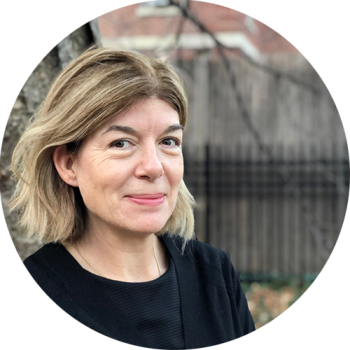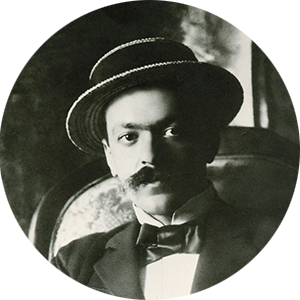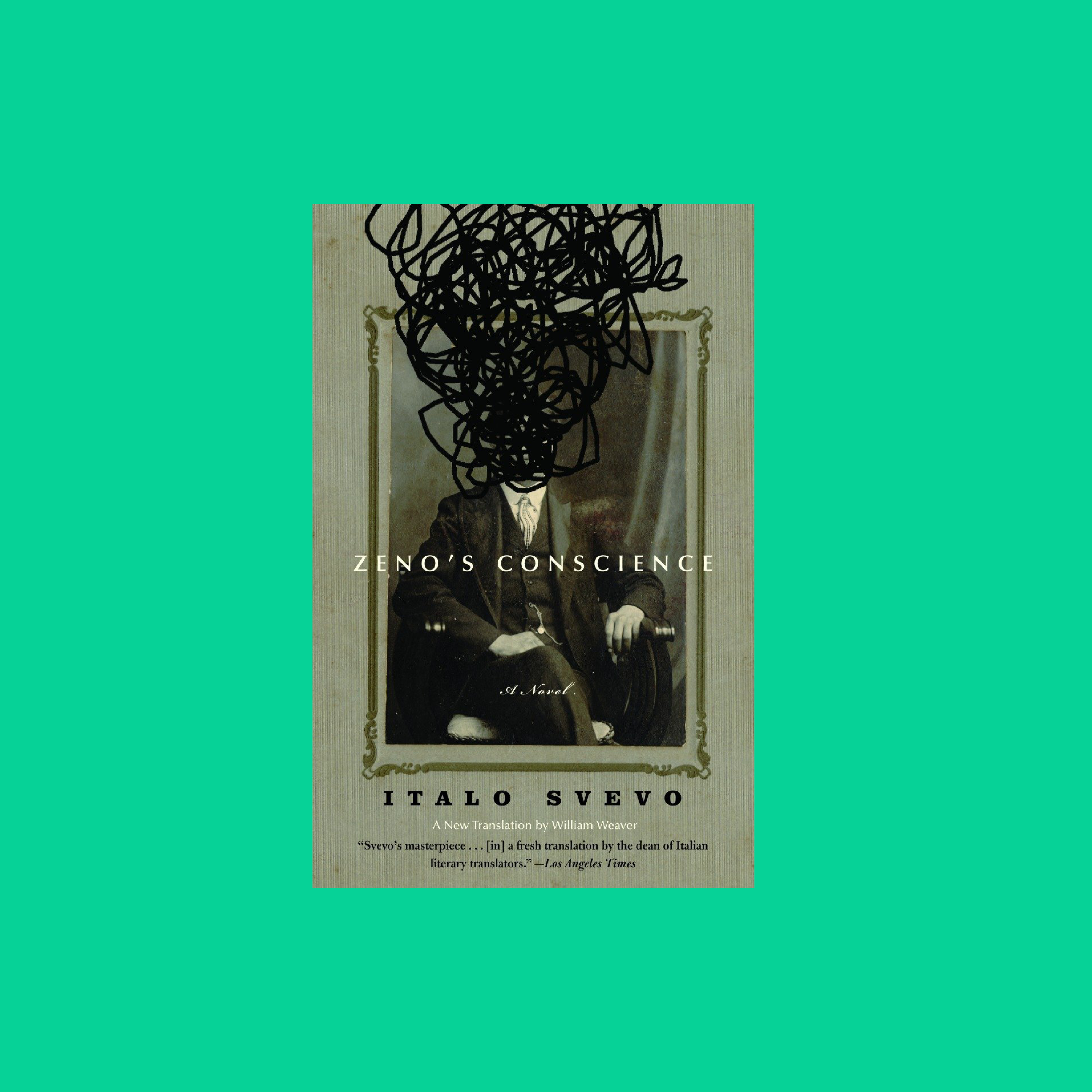APS TOGETHER
Zeno’s Conscience by Italo Svevo

Hosted by Claire Messud
Began on September 13, 2022 (21 Days)
Share this book club
Italo Svevo’s third and final novel, Zeno’s Conscience, is most famously a novel about quitting smoking. It is obviously more than that, an extraordinary and slippery liar’s memoir; but when all else is forgotten, Zeno’s addiction and its ramifications remain. The Triestine idler Zeno Cosini, and through him the Triestine writer Italo Svevo, make a life’s philosophy not simply of smoking, but of the joys of the last cigarette: “I believe the taste of a cigarette is more intense when it’s your last,” Zeno announces in the book’s opening.... Zeno’s Conscience is a masterpiece, a novel overflowing with human truth in all its murkiness, laughter and terror, a book as striking and relevant today as it was when it was first published, and a book that is in every good way—its originality included—like life.
—from “The Liar’s Tale” by Claire Messud (New Republic)
Join us on October 6 for a virtual conversation of Zeno's Conscience with Claire Messud.

Claire Messud
is the author of seven works of fiction including the novels A Dream Life (Tablo Tales), The Burning Girl (Norton), and The Emperor’s Children (Knopf); a collection of novellas, The Hunters (Harcourt); and the autobiography in essays Kant’s Little Prussian Head and Other Reasons Why I Write (Norton). Her essay “Two Women” appeared in A Public Space No. 29. She has received numerous honors, including the Strauss Living Award from the American Academy of Arts and Letters. She teaches at Harvard University.

Italo Svevo
(1861–1928) was the pen name of Aron Hector Schmitz. A pioneer of the psychological novel, Schmitz was born in Trieste, Austrian Empire (now Italy). He pursued his literary aspirations while working in business, publishing his first novel Una Vita (A Life) at his own expense in 1892, followed by Senilità (later translated as Emilio's Carnival). In 1906, he engaged then-unknown James Joyce as his English tutor in Trieste, whose support of Schmitz's work kept Zeno's Conscience from disappearing into obscurity.
Daily Reading
Day 1
Zeno's Conscience. p. 3 (Preface)—p. 20 (“I was too busy missing other things.”)
September 13, 2022 by Claire Messud
As Elizabeth Hardwick points out in her preface, “Everything about Svevo was somehow split in two, his psyche and his very existence.” Born Ettore Schmitz, he took the pen name Italo Svevo—the Italian Swabian, an apt name for a man both Italian and German by heritage, raised in Trieste, a city that belonged, in time, both to Austria and to Italy.
Day 2
Zeno's Conscience. p. 20—p. 37 (“But I would have been amazed to see him really happy, alone and old as he was.”)
September 14, 2022 by Claire Messud
When Zeno’s wife leaves him in Dr. Muli’s clinic, to be imprisoned by a nurse named Giovanna until he quits smoking, she smiles and wishes him strength. Paradoxically that smile, “which I so loved”, wakens in him a feeling that “an enterprise undertaken with such seriousness was doomed perforce to fail at once” he’s lost before he’s begun!
Day 3
Zeno's Conscience. p. 37—p. 60 (end of “My Father’s Death”)
September 15, 2022 by Claire Messud
On the eve of his death, Zeno’s father laments that he can’t convey his life’s wisdom to his son: “Oh, how I would like that! I see into things; and I see what is right and true and also what isn’t.” But he will die without imparting his knowledge—and Zeno will remain convinced that “I could learn nothing from him.” Svevo captures life’s tragicomedy so lucidly; Zeno’s folly is comic, inevitable, and appalling all at once.
Day 4
Zeno's Conscience. p. 61—p. 80 (“It’s surely easier to change oneself than to reshape others.”)
September 16, 2022 by Claire Messud
Zeno’s first encounter with his future wife’s family is with the patriarch, Giovanni Malfenti. Zeno is highly educated and “cultivated”; while Malfenti is “a great businessman, ignorant and active”. Malfenti’s ignorance gives him “strength and peace of mind”—and Zeno, like Dostoevsky’s Underground Man, envies him, and tries to imitate him.
Day 5
Zeno's Conscience. p. 80—p. 98 (“On the crowded Via Cavana, therefore, I had thought more purposefully than in my solitary study.”)
September 17, 2022 by Claire Messud
Zeno expresses the truth that romantic love is a fantasy: of Ada, he says, “She was the woman I had chosen, she was therefore already mine, and I adorned her with all my dreams, so that the prize of my life would appear more beautiful to me.” Not, generally, a good recipe for a relationship…
Day 6
Zeno's Conscience. p. 98–p. 117 ("'Good for you, Zeno. You’ve earned your keep.’”)
September 18, 2022 by Claire Messud
When his old friend Tullio tells him about his vast medicinal intake of lemons, Zeno considers it a great idea, although he dislikes lemons—because “Complete freedom consists of being able to do what you like, provided you also do something you like less.” An interesting definition of freedom!
Day 7
Zeno's Conscience. p. 117—p. 139 (“all the flotsam accumulated in my nerves would have been swept away by it.”)
September 19, 2022 by Claire Messud
No reader can forget Zeno’s mistaken courtship in the darkness of the séance: fantasy (that the fabrics against which he brushes, and the little foot, belong to Ada) must encounter reality: only after his confession of love does he realize his arm is around Augusta’s waist.
Day 8
Zeno's Conscience. p. 140—p. 162 (“unless it was crushed beneath an entire speeding train.”)
September 20, 2022 by Claire Messud
Guido’s caricatures of Zeno are the catalyst for physical pain that “was never thereafter to leave me.” More than Ada’s rejection, Zeno attributes his agony to the fact that Guido’s “drawing [was] so superior to mine.” Not only the superior hair, and the superior violin playing, but also the superior drawing!
Day 9
Zeno's Conscience. p. 162—p. 185 (“I had found something more than a mere pretext for doing what it was my desire to do.”)
September 21, 2022 by Claire Messud
Zeno, having upset Augusta on their honeymoon by imagining his possible death from gangrene (!), observes that “health doesn’t analyze itself, nor does it look at itself in the mirror. Only we sick people know something about ourselves.” Self-consciousness and illness are inseparable— or, to put it another way, philosophy is neurosis.
Day 10
Zeno's Conscience. p. 185—p. 209 (“I continued acting the sick man.”)
September 22, 2022 by Claire Messud
For Zeno, adultery and smoking—compulsive behaviors both—seem much the same. In both cases, he deludes himself that he can control himself, when in truth he is controlled by his appetites.
Day 11
Zeno's Conscience. p. 209— p. 232 (“wine shouts it, overlooking whatever life has subsequently added.”)
September 23, 2022 by Claire Messud
When Glenn Gould practiced the piano he turned on the vacuum cleaner, the better to appreciate his playing. In a similar way, Zeno’s affair with Carla only makes him love Augusta more.
Day 12
Zeno's Conscience. p. 232—p. 253 (“but on some crowded city street”)
September 24, 2022 by Claire Messud
Zeno’s desire to please again precipitates callous behavior, when Carla insists he spend the night while Augusta is at her dying father’s bedside: he refers to this as a “sacrifice.” Is his a greater betrayal because of the circumstances? He tells himself it’s “childish” to think so.
Day 13
Zeno's Conscience. p. 253—p. 271 (end of chapter)
September 25, 2022 by Claire Messud
Zeno, incorrigible liar, pretends to Carla that Ada is his wife: “I may have thought that the more beautiful she found my wife, the more she would appreciate the man who sacrificed… such a woman to her.”
Day 14
Zeno's Conscience. p. 272–p. 296 (“I would not torment myself any more for having wanted to play that false role of Mentor.”)
September 26, 2022 by Claire Messud
Zeno then turns to his friendship, and business relationship, with his brother-in-law Guido: flattered by the invitation to join Guido’s business, he later wonders, “Why should I feel good in that position simply because I believed my great friendship for Guido signified a great indifference toward Ada?” Once again, the motivations behind Zeno’s actions are perverse and objectively inscrutable!
Day 15
Zeno's Conscience. p. 296—p. 318 (“the Ada who had scornfully repulsed me no longer existed, unless my medical books were mistaken.”)
September 27, 2022 by Claire Messud
Guido’s violin, that source of early envy for Zeno, proves “a kind of Achilles’ spear in the variety of its functions”—a seductive music for Carla as it had been for Ada, it then becomes a buffer between Guido and his wife at home. Music, in Zeno’s Conscience, plays as much a role as do some characters…
Day 16
Zeno's Conscience. p. 318—p. 336 (“But did that axiom apply also to Guido?”)
September 28, 2022 by Claire Messud
Zeno’s dream—not his first, of course—upsets Augusta because she feels it reveals his continued attachment to Ada (an attachment he is always at exhausting pains to deny—methinks he doth protest too much!). Does the truth lie more in dreams than in wine? “When you are caught dreaming, it’s hard to defend yourself,” Zeno says: stripped of the superego, the id will have its day…
Day 17
Zeno's Conscience. p. 336—p. 357 (“…unless I was supported by all the members of the family.”)
September 29, 2022 by Claire Messud
Zeno doesn’t really believe Guido has attempted suicide, because he has failed. Again, his virility is in question: “It’s an action unworthy of a man!” And any “seamstress…in her humble room” can successfully commit suicide if she chooses. Even when he visits Guido and Ada, Zeno tries to read the scene as one of Guido’s falsehoods: “Did he remember he was to simulate the great effect of the morphine?”
Day 18
Zeno's Conscience. p. 358— p. 378 (“I would say this to Ada herself at the first opportunity.”)
September 30, 2022 by Claire Messud
Zeno has perhaps unusual ideas about what’s objective and what’s subjective—or perhaps not so unusual? He thinks that beauty, for example, which he deems “a woman’s health” (!), is for him (or another man) to decide. Hence he is amazed that “Ada believed she was still beautiful!”
Day 19
Zeno's Conscience. p. 378—p. 394 ("I would find, at tomorrow’s opening, the high level of that morning.”)
October 1, 2022 by Claire Messud
The series of mishaps that lead to Guido’s death are worthy of Zeno at his most absurd—each small failing or obstacle compounds the situation, from the maid’s loss of the note for the doctor in the rainstorm (the doctor named “Mali,” which in Italian means “evils”), to Zeno’s failure to reproach said doctor for his negligence…
Day 20
Zeno's Conscience. p. 394—p. 418 (“…I must throw away these playthings.”)
October 2, 2022 by Claire Messud
When Ada puts forward her (highly plausible) understanding of events—that Zeno never loved Guido, indeed hated him; and that she herself, in envying Zeno and Augusta’s marriage, also failed to love her husband—Zeno initially cannot accept it. But hearing her creates in him uncertainty: “I saw that her words had created a new world, like all words that are not true.”
Day 21
Zeno's Conscience. p. 418—End
October 3, 2022 by Claire Messud
"Old as I am, for some time women have no longer looked at me. If I stop looking at them, then all ties between us are severed.”
